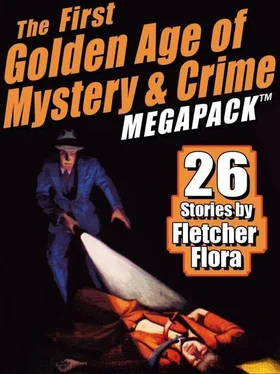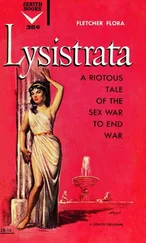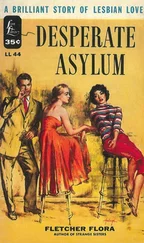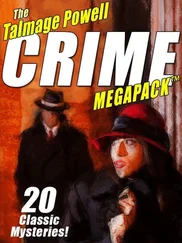She finished out the knife, cut the rawhide, and dropped it and the knife into her beach bag, which she had carried all this time. Then, feeling relieved and composed, she went back into the house and found Stuart waiting where she had left him.
“Loren is still out on the terrace,” she said. “He seems to be dead. You had better call the police.”
“Police!” Stuart jumped and stared at her. “Why the devil should I call the police?”
“If I’m not mistaken, Loren has been murdered. Strangled, I believe. He had many enemies, you know. Apparently one of them slipped up behind him and choked him to death.”
“Oh, sure!” Stuart’s eyes, which had popped wide open, were now narrowed. “This wouldn’t be the happy surprise you were talking about, would it?”
“Please don’t waste time, Stuart. Are you going to call the police, or aren’t you?”
“I am not . What I’m going to do is get out of here immediately.”
“Don’t be absurd. You can’t possibly be involved, and neither can I. After all, we were away together all afternoon. Besides, it will only look worse for you if you leave.”
“Not if you don’t tell anyone I was here.”
“I’ll certainly have to tell the police. You know very well that it’s illegal to withhold information in a murder case.”
“It’s also illegal to strangle husbands.”
“I haven’t strangled a husband — not mine nor anyone else’s. Stuart, do as I say. Go and call the police immediately.”
“Well, it looks like I’m hooked, and I’ll have to.”
“That’s a good boy. In the meantime, I’ll go up to my room and lie down. It’s expected of widows to behave properly in these matters, and I don’t want to create a bad impression — especially for the police.”
She went upstairs, carrying her beach bag. In her room she hung the bag on a hook far back in her closet, then kicked off her shoes and lay down on the bed. She was inwardly far too excited to continue lying there, however, and after a while she got up and sat in a chair by a window.
She wished that the window overlooked the terrace so that she could watch what would go on down there; but the terrace was on the other side of the house. It would be necessary, she thought to dispose of the strip of rawhide, but there would be plenty of time for that later. Meanwhile it would be safe enough where it was, in the beach bag, for there was no reason in the world why anyone should look into it, or even think of looking.
Now that it was so nearly finished, she felt a great urgency to have it finished altogether. She sat quietly, listening for sounds, but she could hear nothing in the big house and see nothing pertinent from the window. After a long time she began to suspect that Stuart had not even called the police as he was instructed to do. She was almost ready to go downstairs and see for herself if he was still there or had sneaked away like a coward, when there was suddenly, without the prelude of any other sound, a brisk rapping on her door and a voice that sounded somehow official. “Mrs. Bauer. Are you there?”
“Yes,” she said. “Who is it, please?”
“Lieutenant Peavy. Police. I’d like to talk with you if you feel up to it.”
“Of course. Just a moment.”
She stood up and put on her shoes and opened the door.
“I’ve been lying down,” she said. “I understand. Are you sure you’re ready to talk?”
“Quite ready.”
“Will you come downstairs, or would you prefer to talk here?”
“Here, if you don’t mind. Please come in.”
She crossed to the bed and sat on the edge of it, while he pulled the chair around from the window and sat facing her. As a policeman, she thought, he looked remarkably inoffensive. To be perfectly candid, from her particular point of view, he looked relatively safe if not inept. He was slight of build, with limp brown hair brushed over from the side, and his tired suit hung loosely on his body. He held his hands clasped between his knees, as if he were embarrassed and uncertain of himself.
“I wonder,” he said, “if you would just tell me just what happened.”
“There isn’t much to tell, really. I’ve been away this afternoon. I went swimming at the Country Club with Mr. Bauer’s nephew. I believe you met him downstairs. When we left here, Loren was sitting on the terrace in the sun. He was going to wheel himself inside when he’d had enough. Stuart and I didn’t return until rather late, and I found Loren still on the terrace. You know how he was when I found him.”
“Yes. Dead. Strangled. Tell me, Mrs. Bauer, did you see the weapon?”
“The weapon?”
“Yes. Whatever was used to strangle him. From the appearance of his throat it must have been a very stout cord or a steel wire. Something like that.”
“I didn’t see it whatever it was. The murderer must have taken it away with him. Wouldn’t he naturally do that?”
“He might. He might not. In this case, he did. Or he didn’t. What I mean is, the weapon was taken away — but not at the time of the murder. It remained in place around the victim’s throat all the time he was on the terrace. Until you came home, Mrs. Bauer? ”
“What’s that? What did you say?” Lieutenant Peavy twisted his hands together, giving the impression of wringing them in an agony of embarrassment.
“I see that you got the beginning of a tan on your face and throat this afternoon, Mrs. Bauer. So did your husband. Except on the narrow line around his throat that the sun didn’t touch . Can you explain that?”
She couldn’t, of course. She couldn’t even try. She wondered desperately if she could somehow put the blame on Stuart, but it didn’t seem likely. Most of all, she wondered how she could have failed to think of such a simple thing while being so clever about everything else. Now they would certainly search her room and look into her beach bag — and there was not a thing she could do to prevent it.
What was Peavy saying ?
“I’ve been trying to figure out how you did it, Mrs. Bauer,” he was saying, “and I think I’ve got it.” His expression was almost ludicrously apologetic. “You see, I watch the late movies on television too.”
Originally published in Ellery Queen’s Mystery Magazine , September 1964.
In the first place, this Dr. Wade Loos went to see Detective-Lieutenant Jesse Risen. In the second place, Detective-Lieutenant Jesse Risen came to see me. In the third place, naturally, we caught the poisoner. My name, by the way, is Roscoe Fay.
It was a cold overcast afternoon in November, shortly before Thanksgiving, and I had a small fire on the hearth for cheer, supported by central heating for comfort. Lieutenant Risen came into my study, tossing his deplorable hat and topcoat into a chair by the door, and dropped heavily into another chair which, anticipating him, I had pulled up before the fire. It was apparent that he was in an ugly frame of mind, resulting from a severe case of frustration, and I offered him some bourbon and water as an alleviative, which he accepted.
I had, of course, anticipated his mood as well as his person. Risen sneers at me as an amateur criminologist in fair weather, but every time the weather turns foul, figuratively speaking, he comes running to consult me. He comes, in brief, to pick my brains. I may as well, I think, be candid about it.
“Now,” I said, when he had swallowed some of his bourbon and water, “what’s the problem this time?”
He scowled at his glass. “Who says there’s a problem?”
“Oh, come off it, Risen. Let’s not delay the accomplishment of your mission. The only time you come to see me is when you do have a problem. You have one now, and I confess that I’m eager to hear about it.”
Читать дальше












